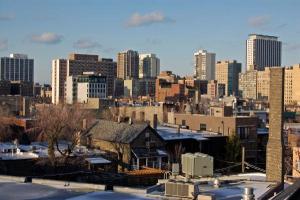By Jane Zhang
CHICAGO — The average Chicagoan spends 25 minutes commuting to work every morning, but at a closer look, women of African-American descent spend on average 80 minutes more per week traveling than their white counterparts.Virginia Parks of the University of Chicago identified these troubling racial and gender-based inequalities in her research on low-wage labor markets in Chicago. Urban mobility is directly linked to economic mobility, meaning households decide on residential location based on jobs, according to Parks. As her research shows, however, racial segregation still plays an informal role in cities. This raises the question of urban accessibility — not just getting from Point A to Point B, but easy, affordable, and ecological forms of transport for all.
One way to generate accessibility is through urban density, or increasing the number of inhabitants in a given area. Often city centers and downtown core areas have higher density than outlying areas, which has many environmental benefits like land use, water, energy, and savings. Parks and other researchers made a clear environmental case in support of urban density, during the annual meeting of the American Association for the Advancement of Science in Chicago on February 15.
In North America, urban dwellers have much smaller ecological footprints than their suburban counterparts. New Yorkers, for example, have 30 percent of the carbon footprint of the average American. This is due in no small part to the savings in land use, greater number of transportation options and energy and water use savings with centralized infrastructure. Public transit, for instance, is much more land- and cost-effective than paving and maintaining roads, highways and parking for cars.
With a growing 53 percent of the world population residing in cities, humans live in an increasingly urban global network, where cities hold greater importance than nation-states. Each week, one million people migrate to urban areas — the equivalent of building one Chicago every month and a half. The need to accommodate these new populations is a pressing issue, and urban density appears to be a plausible response.
However, while transit-oriented development and walkable downtown cores seem logical, sustainability involves social aspects as well as environmental ones. Urban density has the potential to generate higher accessibility, but the question is for whom. For the privileged elite, urban density is simply one factor in deciding residential location, but not everyone has the luxury of choice. In many cities, increasing density could mean gentrification, where commercial developers restore run-down urban areas, often pushing low-income residents into peripheral, sparsely populated areas with longer commute times. The disparity raises the question of justice in density-based urban planning.
There is no such thing as a “just” city, though some may be more just than others, says sociologist and urban theorist Saskia Sassen of Columbia University. She sees the power of cities in their “collection of voices” and argues for the importance of diverse forms of knowledge — from the official political documents to the homeless person’s in-depth understanding of New York City’s rat population. “A successful city is one in which even the most powerless have the opportunity to write their own history”, Sassen says.
The potential danger of density lies in the idea of urban megaprojects stifling the voices of local people, she notes. Density can be in the form of clean, walkable, tree-lined streets, but could also mean giant LEED-certified commercial skyscrapers that, despite their environmental performance ratings, impose themselves upon communities and erase the diversity of a healthy city. In light of all this, the 21st century sustainable city will most likely be dense and ideally a place where the kid next door has just as much say in her city as its mayor, Sassen suggests.
Jane Zhang is a graduating student in the interfaculty Sustainability, Science, and Society program at McGill University. She is passionate about cities, food, and environmental justice. She writes regularly for the Science+Technology section of The McGill Daily. Email her at jane.zhang@live.com or follow her on Twitter @plainzhang.




